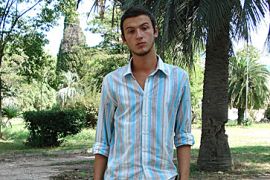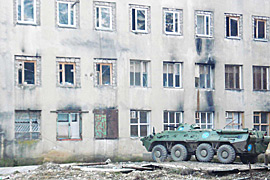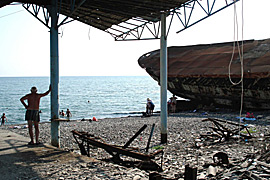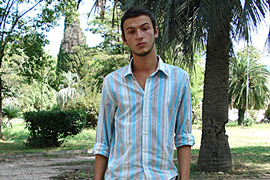Abkhaz youth hail independence
Youngsters say they feel little connection to Georgia.

 |
|
Propaganda posters in Abkhazia show Abkhaz, Russian and South Ossetian flags |
Young people in Georgia’s breakaway republic of Abkhazia tell Matthew Collin that their future is getting brighter, after Russia recognised the region as an independent state.
The bridge over the Inguri river is what Abkhazia would like to see as its international border crossing with Georgia. But the only way across, unless you walk, is on a rickety horse-drawn cart.
On either side of the bridge are Georgian and Abkhaz checkpoints. In the middle, Russian peacekeeping troops stand impassively at their posts, cradling their Kalashnikovs.
Not far from the crossing, just inside Abkhazia, scores of Russian armoured vehicles are lined up by the roadside.
Checkpoints, military hardware and men in camouflage uniforms are common sights for young people growing up in Abkhazia, a fertile Black Sea region which has been striving to win independence from Georgia since a civil war in the early 1990s.
 |
| Russian military vehicles are a common sight in the breakaway state |
From an early age, children are instilled with patriotic fervour for their “independent republic”.
In a classroom at School Number Two in the capital, Suhkumi, there is a memorial to those who died fighting during the war, as there is in most schools here.
“They defended our homeland and we should remember them,” an 11-year-old schoolgirl said, pointing to black-and-white portraits of the fighters who she described as heroes.
“They gave their lives for us and for peace in our country.”
The children had also drawn pictures of Abkhaz military forces on parade. “That is one of our tanks, that is one of our planes, that is one of our helicopters,” recited another child, prompted by her teacher.
Tourist destination
In the Soviet era, Sukhumi’s sub-tropical climate and lush landscape made it a much-loved tourist destination. It is still a seaside resort, but many of its once-elegant buildings have been damaged or destroyed by rocket fire.
The city’s streets are half-empty, partly because its Georgian population fled during the war.
Around 250,000 Georgians were driven out of Abkhazia, and many of them may never be able to return to their homes.
 |
| Sukhumi used to be a popular tourist destination |
Since the war ended in 1993 with the fall of Sukhumi, Abkhazia has been isolated from the world, both politically and economically, which means there are few opportunities for young people.
Many leave the region to study or work in neighbouring Russia.
But Abkhazia is now hoping for a massive influx of Russian investment after Moscow controversially recognised its independence in the wake of the Georgia-Russia war in August.
A group of students walking along the palm tree-lined seafront promenade said they believed that their future was already looking brighter.
“Life isn’t so easy now, there are a lot of problems, and there are a lot of problems that we must resolve in the future, but I think the situation is getting better and better, especially after our recognition,” said one of the students, Alyas.
“Yes, I think recognition will significantly improve the situation; we will at least feel that we exist, and can live like a proper state,” added his friend, Sabina.
‘Connection’ to Russia
One young Abkhaz who is trying to create his own identity is 20-year-old musician Genry Gumba. His heroes are not Abkhaz fighters, but American rappers like Eminem and 2Pac.
Genry raps in the notoriously complex Abkhaz language – but also in Russian, which is the dominant tongue here. He has a Russian passport, as most Abkhaz people do, making them effectively Russian citizens, and Abkhazia a Russian protectorate.
“Of course we feel close to Russia,” Genry explained. “We have become closer because they recognised us and because of what they have done for us.”
 |
| Genry feels no connection to Georgia |
Like most young Abkhaz, Genry feels no connection with Georgia, after years of diminishing contact between the two sides.
He hardly remembers the war and says that although he lost relatives, he does not hate Georgians, unlike some older Abkhaz who experienced the fighting directly.
But he does not think that reconciliation will be possible for many years to come.
“Maybe this will happen when our generation is already gone,” he said. “You see, they’ve done too many terrible things to us. I think 50 years will have to pass before it happens.”
Worryingly for those who see Abkhazia as an integral part of Georgia, and for the Georgian government, which still hopes to win the region back, Genry says that people of his generation want nothing more to do with their Georgian neighbours.
“We cannot take the first step towards friendship today because we don’t know how they’ll behave with us tomorrow,” he insisted.
“This is how we look at it: We have lived without them, we can live without them.”